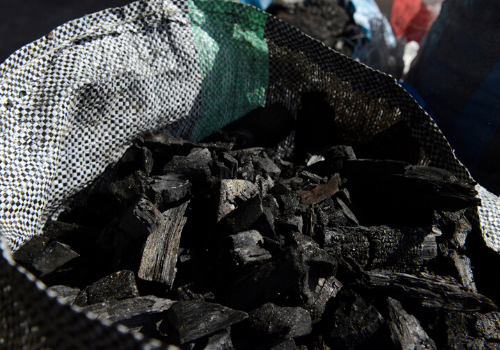Several manufacturers and construction firms are demonstrating the viability of a unique and more sustainable approach to building roads and buildings. The use of recycled materials is now extending far beyond rubber, tire and plastic. Nowadays, bold innovators are finding practical ways to utilize organic materials and waste in the creation of everything from asphalt sealants and cinder blocks to insulation, walls and ceilings.
The list of unique uses of organic waste in construction has grown quite extensive. For instance:
- Mushrooms — particle board and foam brick
- Wheat — boards for both internal and external walls
- Bananas — fibers for carpet
- Sunflowers — high-strength composite boards for floors, ceilings and walls
- Peanut shells — particle board
- Potatoes — insulation
- Rice — as a filler in concrete mix
- Pineapples and citrus peels — leathery material for things like furniture
Here’s a look at four specific organic materials that are already showing a lot of promise for the construction industry.
1. Hempcrete
The woody fibers of the cannabis plant known as hemp have been used to make things like paper and rope. Now they are being used to manufacture a product known as Hempcrete. Hemp fibers, when mixed with a lime-based binder and water, create a material similar to concrete. That material can be applied directly like any loose-fill concrete, or can even be turned into pre-dried blocks. Hempcrete can also be sprayed onto surfaces as a foam-like insulation.
Using Hempcrete can be a bit labor-intensive and does require somewhat of a learning curve, but it can also prove to be highly profitable. Other benefits include:
- Sequesters carbon which is good for the ozone
- Effective at insulating and absorbing sound
- Resistant to fire, pests and mold
- Non-toxic
- Requires less maintenance
 2. Biochar
2. Biochar
Biochar is a charcoal-like substance made from burning organic material. Its ability to absorb five times its weight in water, retain nutrients and enhance soil fertility is why biochar is already popular in agriculture and landscaping.
Now biochar is finding applications in construction. This material’s low thermal conductivity, coupled with its ability to retain so much water, makes it great at insulating and regulating humidity. That is why biochar is useful during the early stages of road construction. When mixed with asphalt or concrete, biochar reduces the amount of heat absorbed by the road which can ultimately result in reduced maintenance.
Biochar can also be used with clay, lime or cement as an additive for plaster or bricks. Biochar-clay plasters, for example, absorb odors and toxins, making them ideal for everything from warehouses and fitness centers to hospitals and office buildings.
3. Soybeans
A soybean-derived polymer material developed by the National Center for Asphalt Technology (NCAT) is a versatile, safe and affordable new option for asphalt pavements. It also has application in concrete and other building materials.
RePLAY Agricultural Oil Seal & Preservation Agent contains 56 percent soybean oil. It has proved effective as an asphalt sealant in the demanding environment of Minnesota. The product deeply penetrates asphalt, helping reverse the oxidation process beneath the surface and potentially repair hairline cracks at the surface. As the result, RePLAY can help extend the life of asphalt surfaces. Because the product is clear, no repainting of lane lines is necessary, reducing both road closures and labor cost. RePLAY is also non petroleum-based which means there are no harmful fumes associated with it.
The NCAT has produced a case study chronicling the effectiveness of RePLAY. Both the Mississippi and Tennessee Departments of Transportation have sponsored rejuvenating seal experiments. RePLAY was applied over an asphalt surface layer (6.8 percent asphalt content) with a mix of gravel aggregate. The product received an A-grade, solidifying its potential as a low-cost, environmentally friendly option for retarding or preventing surface deterioration of pavements. The bonus is that no special application equipment is needed.
4. Corn
Another sustainable agriculture product has been finding its way into the asphalt market. Corn has similar benefits to soybeans in that it provides a safer, environmentally friendly alternative to traditional asphalt mixes.
One product already being marketed is called JIVE. Available in liquid form, JIVE is being utilized as an asphalt rejuvenator as well as a coating additive for asphalt shingles. The product promotes several benefits:
- Reduces viscosity
- Improves low-temperature properties while limiting high-temperature rutting
- With shingles, can improve penetration without reducing the softening point
One user of JIVE said his construction company has been asked by many agencies to eliminate the use of recycled engine oil as a component of asphalt cement for use in hot mix paving applications. “We find the use of JIVE to be a good fit for this replacement,” the customer said. “JIVE is an environmentally safe replacement and seems to react well with most asphalt and polymer blends.”
Innovative construction material solutions like these will be on display at the Tech Experience at CONEXPO-CON/AGG 2020. Located in Silver Lot 3 and Festival Grounds, show attendees can learn how numerous technologies are changing the face of the construction industry in three key areas: modern mobility, sustainability and smart cities.












